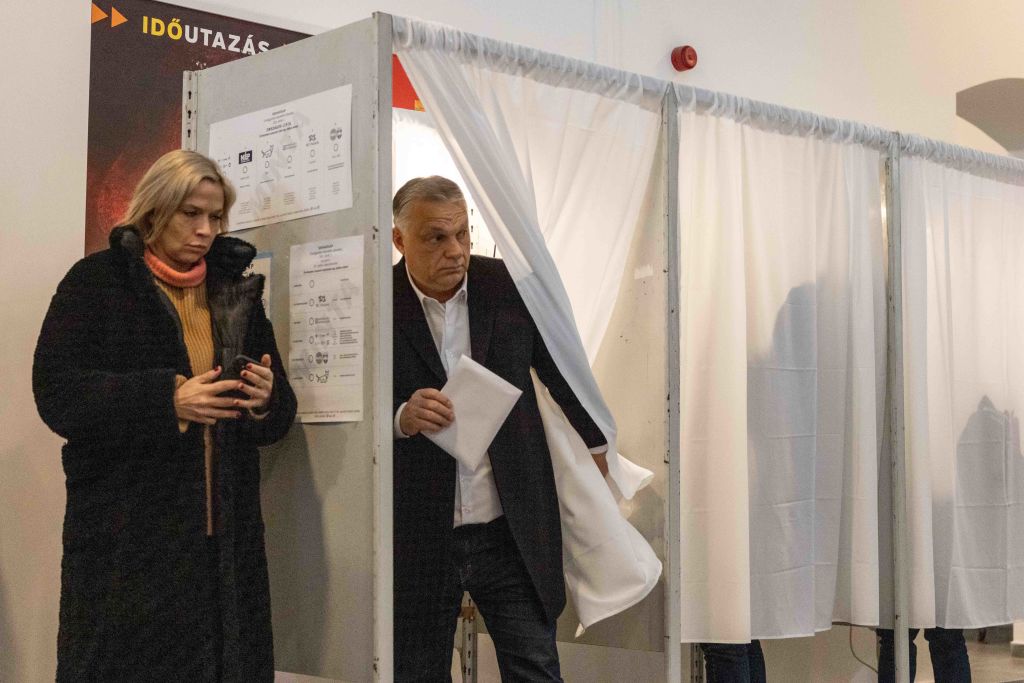
Hungarian Prime Minister Viktor Orban has just won a fourth term. In a democracy, such a victory would reflect the decision of the voters to whom the incumbent is accountable. But in Hungary, the European Union’s only full-blown
autocracy, the outcome merely reflects the incumbent’s manipulation of the electoral process. With Orban securing his fourth consecutive supermajority, Hungary has clearly become a country where elections are decided before polling day.
To be sure, classic electoral fraud through falsifying the vote count was probably limited, owing to organised civil-society efforts to ensure that opposition delegates were present in every polling station. If there was massive fraud, it would have been in the mail votes from abroad, many of which were collected by organisations connected to Orban’s party, Fidesz. The
discovery of burned opposition ballot papers in Romania helps to explain why over 90% of mail-in votes have
favoured Fidesz in the last two elections.
This was not the first
manipulated election in Hungary. After Fidesz won its first supermajority in 2010, it changed the electoral law unilaterally to boost its own future results (through gerrymandering and new rules awarding extra seats for big wins in individual districts). With these changes in place, Fidesz retained its supermajority in 2014, even though it
received 8% less of the vote than it had in 2010.
Changing the rules has since become the party’s modus operandi. Its amendments to the electoral law now number in the hundreds; the latest were adopted just months ago. Owing to the electoral system’s skewed rules, Fidesz has secured 68% of parliamentary seats with 53% of the vote.
On top of this, Fidesz won its simple majority of the popular vote by leveraging the full power of the state on many fronts. In the month before the election, the government disbursed cash payments to households totalling around 3% of GDP,
including tax refunds to 1.9 million employees, an extra month of benefits to 2.5 million pensioners and large bonuses to 70,000 members of the police and armed forces.
Second, pro-government forces spent
eight times more on political ads than the opposition did, in what appears to have been a violation of the country’s spending cap. And the government itself spent freely to boost Fidesz’s votes under the guise of public service announcements, and by scheduling a homophobic ‘child protection’ referendum (a central Fidesz campaign theme) to coincide with the election.
Third, Fidesz continued to deploy public media
as a propaganda machine. The basic strategy used this time was no different from what the Organization for Security and Co-operation in Europe
reported before the 2018 election, when 96% of public news coverage about the government was positive, and 82% of its coverage about the opposition negative. Since 2018, virtually no opposition politicians have been invited to appear on the public media’s political shows. During the campaign, each party with a national list was granted just
five minutes of airtime to present their party platform.
Meanwhile, public and private Fidesz-controlled media outlets flooded audiences with fake news and slander about Peter Marki-Zay, the candidate for prime minister representing a united bloc of opposition parties. Fidesz-friendly media repeated ad nauseam that the opposition, if elected, would privatise healthcare, allow gender reassignment surgeries for pre-school children and bring Hungary into the war in Ukraine.
Initially, the war seemed to be an issue that would divide the Fidesz electorate: while Fidesz voters have been conditioned with pro-Vladimir Putin and Eurosceptic rhetoric for the past decade, the inflow of tens of thousands of refugees, among them Ukrainian-Hungarians, has aroused much sympathy. The government’s solution was to push a narrative mixing fear and selfishness. The opposition was labelled ‘warmongering’, whereas Orban stood for prudence and restraint. He has
promised that ‘Hungarian families will not pay the price of war’, meaning that he will oppose any proposal that would endanger Russian gas supplies and his own government’s ‘utility price cuts’.
This narrative exploits the
morally unconstrained collective egoism that is a hallmark of populism. While NATO and its Central and Eastern European members (besides Hungary) have backed Ukraine unreservedly, Fidesz voters are absolved from showing solidarity with those in need. The moral obligation to support Ukraine is further undermined through the parroting of
Kremlin propaganda, including denunciations of Ukrainian President Volodymyr Zelensky, whom Orban has now
described as an ‘opponent’.
The election result reflects a highly polarised society, a problem exacerbated by the fact that many Hungarians, especially in rural areas, are ‘informed’ wholly by Fidesz-controlled media. Owing to the scale of media capture, the electoral system’s structural biases and
other factors, the 2022 Hungarian election cannot be considered ‘free and fair’, or even ‘free but not fair’. It was wholly manipulated, and while Orban’s government is ‘elected’, it is not democratic.
Hungary’s government will continue to present a unique challenge at home and abroad. Orban has
described his role in the EU as ‘the sand in the gears of the machinery, the stick caught in the spokes, the thorn in the flesh’. And his close, corrupt relationship with Putin’s Russia represents an even greater security risk to Europe than it did in the past. The question of what the EU
can and should do about autocratic member states will be as pressing as ever.
That said, electoral manipulation in Hungary has not yet reached the same level as in Russia. This year’s election was not completely hopeless for the opposition, which will need to consider why its own vote count
fell by a third since 2018. Opposition MPs now face a difficult dilemma: to accept their own electoral mandates would confer a veneer of legitimacy to an autocracy, but to boycott the new parliament would mean forfeiting what little visibility they have.
 Print This Post
Print This Post